[Report] 10th East West Philosophers' Conference "Value and Values: Economics and Justice in an Age of Global Interdependance"
A group of members from UTCP and the University of Tokyo attended the Tenth East-West Philosophers’ Conference (May 16-24, 2011) held by the University of Hawai'i at Mānoa and the East-West Center.
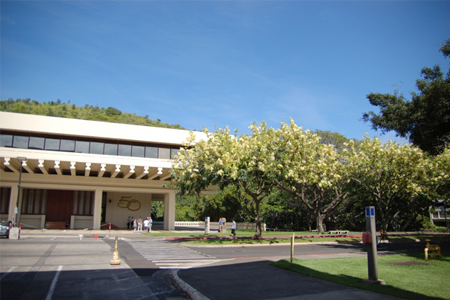
This year’s conference is entitled “Value and Values: Economics and Justice in an Age of Global Interdependence”. Almost fifty sessions were held during this conference. It aimed to reconsider the relation between economics and justice. The comparative approach to philosophy was highly encouraged as a method to consider this issue. Eastern conceptions of economics and justice developed from Buddhistic, Islamic and Confucianistic backgrounds were often discussed on an equal footing with those of Western philosophy. Thus, the conference also afforded participants the chance to discuss the possibility of comparative philosophy and the location of Philosophy in the global world.
Kobayashi Yasuo, the director of UTCP, participated in one of the plenary sessions on 24th May. In this session, titled “Achieving Justice: Institutions and Actualities,” with three speakers (Yasuo Kobayashi, Roger T. Ames, Bent Nielsen) the actual issues like social or educational justice were discussed. Prof. Kobayashi’s paper was entitled “Japan and the End of History: Concerning a Footnote in Kojeve”. Through this presentation, he referred to the disaster of earthquake and tsunami in Japan, revisiting the Kojeve’s theory on the “end of history” and Japan.
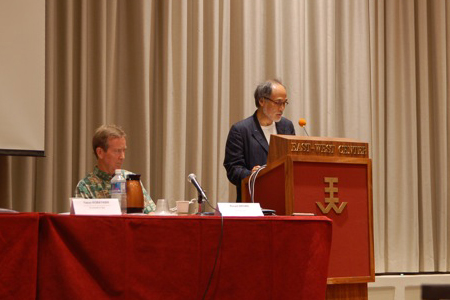
As participants in this conference, the members from UTCP held the session entitled “Rhetorical Moment: Performing Justice(s)” on 24th. Nakajima Takahiro presented his paper entitled “Ritual and Justice in Chinese Philosophy” as the first speaker of this session. In the beginning, he suggested the complicated relation between ritual and justice through reading the Mencius. On the one hand, ritual can be considered as a source of justice in Chinese Philosophy, but on the other hand, justice transcends ritual. Second, he emphasized the importance to reconsider the relationship between ritual and its accord with the emotions of common people by reading Laozi. Third, he focused on the argument by Xunzi that the origin of ritual was related to human desire. For Xunzi, it is necessary to transform natural emotions into civilized ones for the sake of justice. To conclude, Nakajima indicated the transformed or civilized emotions of common people as what connect ritual and justice in Chinese philosophy. Through such a dynamic process between ritual and the emotions of common people, it becomes possible for us to find an alternative idea of justice in the world.
The second speaker was Wakazawa Yusuke. He presented his paper entitled “China as Rhetoric in the Scottish Enlightenment”. His presentation aimed to consider how David Hume evaluates China in relation to his perception of geography and history. Through close reading of Hume's essay “Of the Rise and Progress of the Arts and Sciences”, he considered how and why Hume challenged the former idealized image of China. Two very different representations of China were found in Hume’s essay. Through comparing these two representations, Wakazawa sought to specify the precise rhetorical moment that the meaning of China in Britain began to change. He concluded that Hume tried to reread the changelessness of China in terms of lack of development. The great stability of China was thus interpreted as the stagnation in a strictly negative context. It was the rhetorical moment at which Hume inverted the meaning of unchanging China from stability to stagnation.
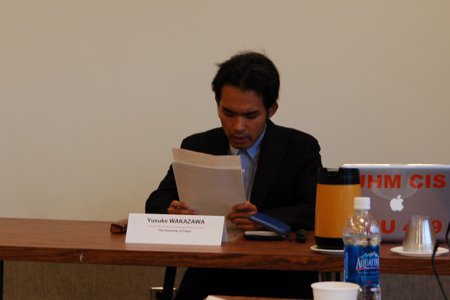
Moon Kyungnam gave a presentation in which he tried to pave the road to discuss Aristotle's rhetorical publicness. Referring to an old and recurring contradiction in Aristotle's Rhetoric on whether to include pathos in the modes of persuasion, Moon argued that Aristotle postulates two conditions which allow us to distinguish the right sort of pathos, i.e., pathos internal to subjects: the orator's self-consciousness of his own emotional state to the issue and the identification of listeners' emotional state to the issue to the orator's. Examining these conditions, Moon gave a conclusion that Aristotle's conception of pathos in his Rhetoric contains a certain kind of publicness in its nature.
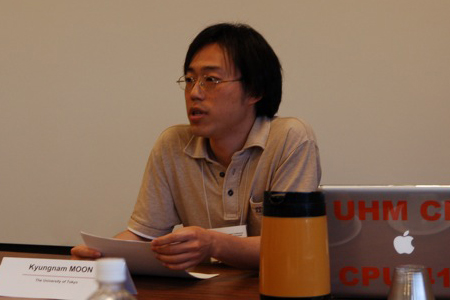
The fourth speaker of this session, Hoshino Futoshi examined the rhetorical problem through reading Longinus. His paper, “Truth and Deception: Rhetorical Limits in Longinus’ On the Sublime” focused on the relationship between “nature (physis)” and “art (techne)” in the discussion of “sublime” in classical Rhetoric and Philosophy. Longinus insists on the reciprocal relation between nature and art. According to Longinus, the sublimity and the figure (namely, nature and art) help to each other: the sublime hides the figurativeness of figures, whereas the figures help the sublimity itself to appear. By treating these discussions, he suggested the impossibility to distinguish the physis and techne in themselves.
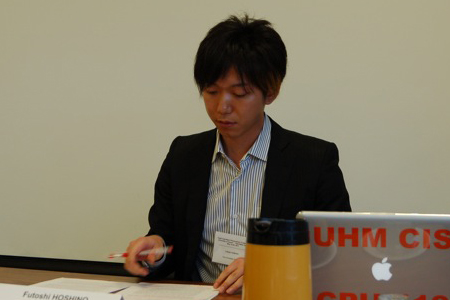
During the stay, the participants could enjoy Hawai'i's natural beauty including wonderful scenery and weather, and the tender solicitude of the members of the University of Hawai'i and the East-West Center was always moving. We especially wish to express our most sincere gratitude to Professor Ishida Masato for his generous support. He took care of us literally from morning to night, and there is no doubt that our stay in Hawai'i would never have been such a fruitful experience without him.
(Wakazawa Yusuke, Moon Kyungnam, Hoshino Futoshi)






